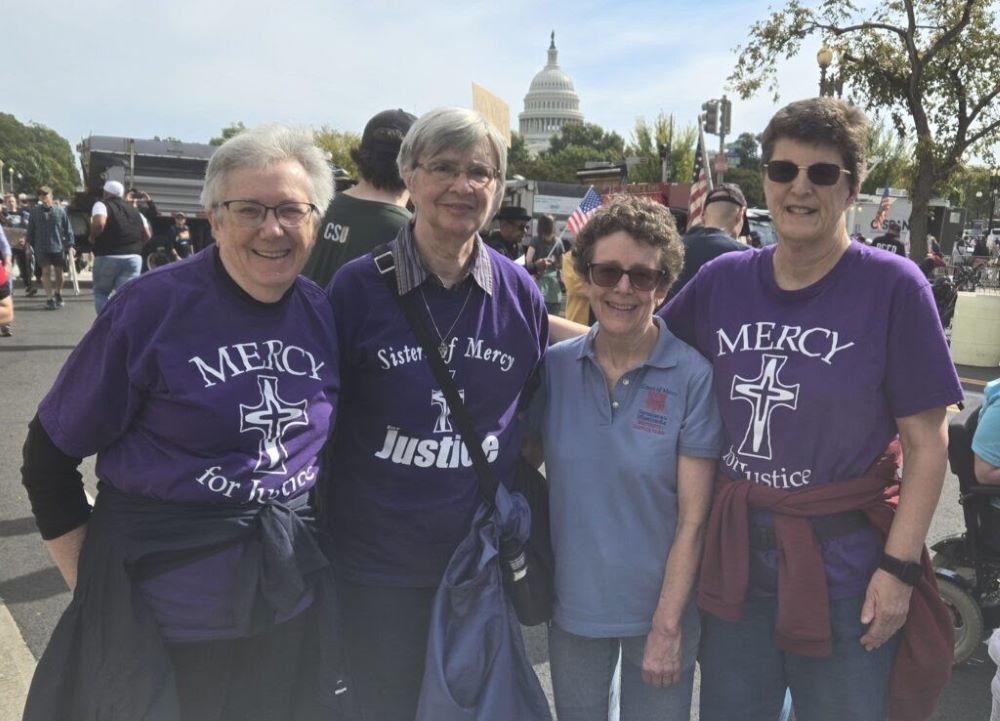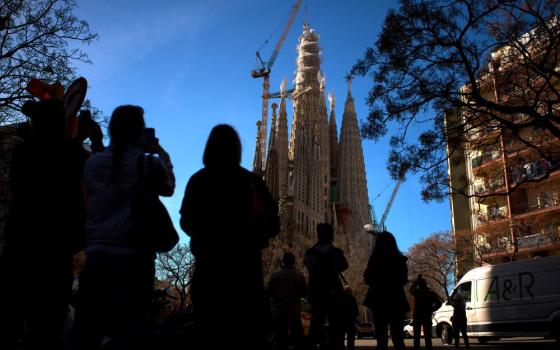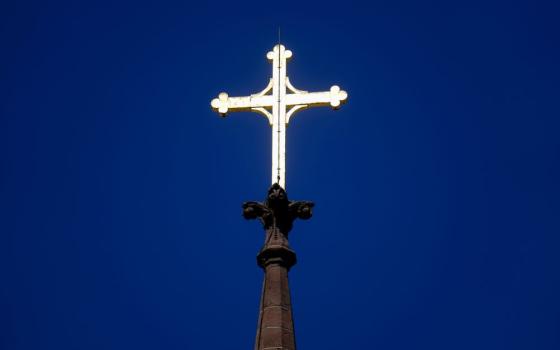
Members of the Sisters of Mercy’s Institute Leadership Team pose for a photo near the U.S. Capitol, where they joined a "No Kings" demonstration Oct. 18. From left are Sr. Patricia Flynn; Sr. Judith Frikker; Marianne Comfort, the team's interim justice director; and Sr. Terry Bednarz. They joined an estimated 7 million Americans who voiced their discontent with the current administration in the national event. (Courtesy of Sisters of Mercy)

Several communities of women religious in the U.S. posted photos of their participation in national demonstrations voicing discontent with the Trump administration's treatment of migrants and other communities under attack.
"The saints didn't serve kings, they served the kingdom," said the Sisters of Charity of New York in an Oct. 17 Instagram post, where they also shared photos of their members holding up signs in Times Square Oct. 18, the day millions of Americans voiced their discontent around the country.
By some estimates, 2,700 "No Kings" events took place coast to coast, with about 7 million participating for the second such event this year, Newsweek reported. Sisters also participated in an earlier "No Kings" event in June.
Like the Sisters of Charity, most women religious who took part said they did so to speak for the poor, for migrants and others on the margins of society.
In Mobile, Alabama, Mercy Sr. Joan Serda told TV station WKRG she was speaking out for the right of the poor to have access to food and health care but also worried about the erosion of personal rights in the country.
"They have a right to assemble and speak out and not be charged with ridiculous crimes because they speak out for what they believe," she said.
The Sisters of Charity of the Blessed Virgin Mary in Iowa posted on Facebook photos of their members who participated in the demonstrations, emphasizing the importance of speaking one's mind, but doing so in a nonviolent way. They also sported T-shirts that said "I was an immigrant and you welcomed me," referring to the Gospel according to Matthew.
Latin American religious join condemnation of violence in Ecuador
The largest organization of women and men religious in Latin America and the Caribbean joined other groups calling on the government of Ecuador to stop excessive force against civilians who have poured into the streets of major cities in the country since September to protest.
"We demand an immediate end to the massacres, persecution, and repression. The path forward is not fear, but dialogue; the future is not built with bullets, but with words and encounters," said the Confederation of Latin American and Caribbean Religious, known as CLAR, in an Oct. 16 statement.
At least two people have died in protests in September and October, according to figures from Ecuador's Alliance for Human Rights, though some groups are reporting a third death from the national police's use of force during confrontations with Indigenous, environmental and other civil society groups. The alliance also has tallied almost 400 reports of human rights violations, more than 200 detentions and 15 disappearances in that time period.
Advertisement
"State violence does not restore social order, but fractures it and paves the way for the systematic violation of human and community rights," CLAR said in its statement.
Ecuador has for some time experienced gang violence fueled by the drug trade. The country's president Daniel Noboa has since 2024 used curfews and a state of emergency in an attempt to deal with the situation. However, many have questioned the methods since gang violence has not been curbed, but instead used to justify a power grab, while police and military violence are unleashed on critics of Noboa's policies.
The latest unrest began when the government halted a subsidy that saw fuel prices increase from $1.80 to $2.80 per gallon in mid-September. As a result, Indigenous groups called for a national strike to protest the end of the subsidy, which some said would excessively increase their families' cost of living. Noboa said gangs were behind the protests and sent heavy police and military presence to Indigenous areas, where violence against the protesters erupted.
CLAR voiced support for the protesters, saying they are nonviolent and have a legitimate right to have their voice heard. Other Catholic Church groups, including the Latin American bishops' council known as CELAM for its acronym in Spanish, joined in their defense.
"With deep concern and sorrow we have received news and reports of serious repression...including mass arrests, injuries, and the freezing of bank accounts belonging to [indigenous] leaders and organizations," CELAM said in a statement. "We firmly believe that indigenous peoples have the democratic right to protest, to be recognized in their dignity, and to have their lives, integrity, and territories protected."
On social media, Noboa defended his government's actions on Oct. 20 and said he would continue the fight against the drug trade. The Inter-American Court of Human Rights denounced the civilian deaths Oct. 17 and said on X that it was concerned about reports of excessive use of force, urging Ecuador to investigate the complaints and take action.
Chicago's Center for the Study of Consecrated Life marks 10 years
The Catholic Theological Union in Chicago will celebrate on Nov. 21 the 10th anniversary of the Center for the Study of Consecrated Life with a daylong conference of scholars, religious and pastoral leaders, a Mass and a gala dinner. Center officials say the anniversary marks "a decade of deep reflection, research, and renewal in the understanding and practice of consecrated life."
The day will end with a dinner honoring "those whose visionary leadership, scholarship, and service have advanced the mission of the Center," and includes women religious. More information can be found here.





